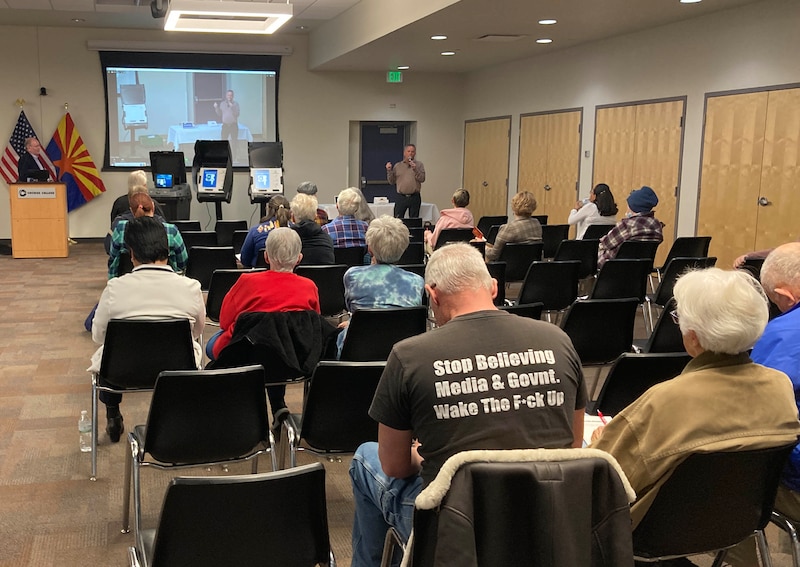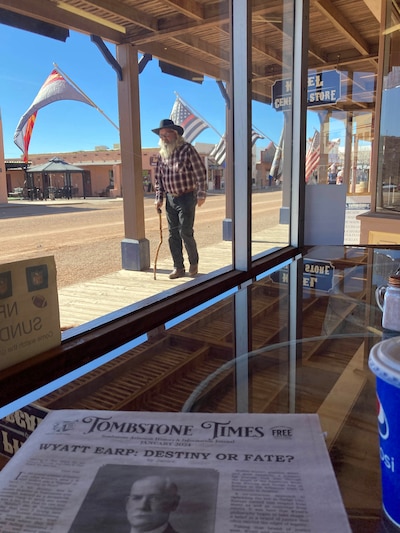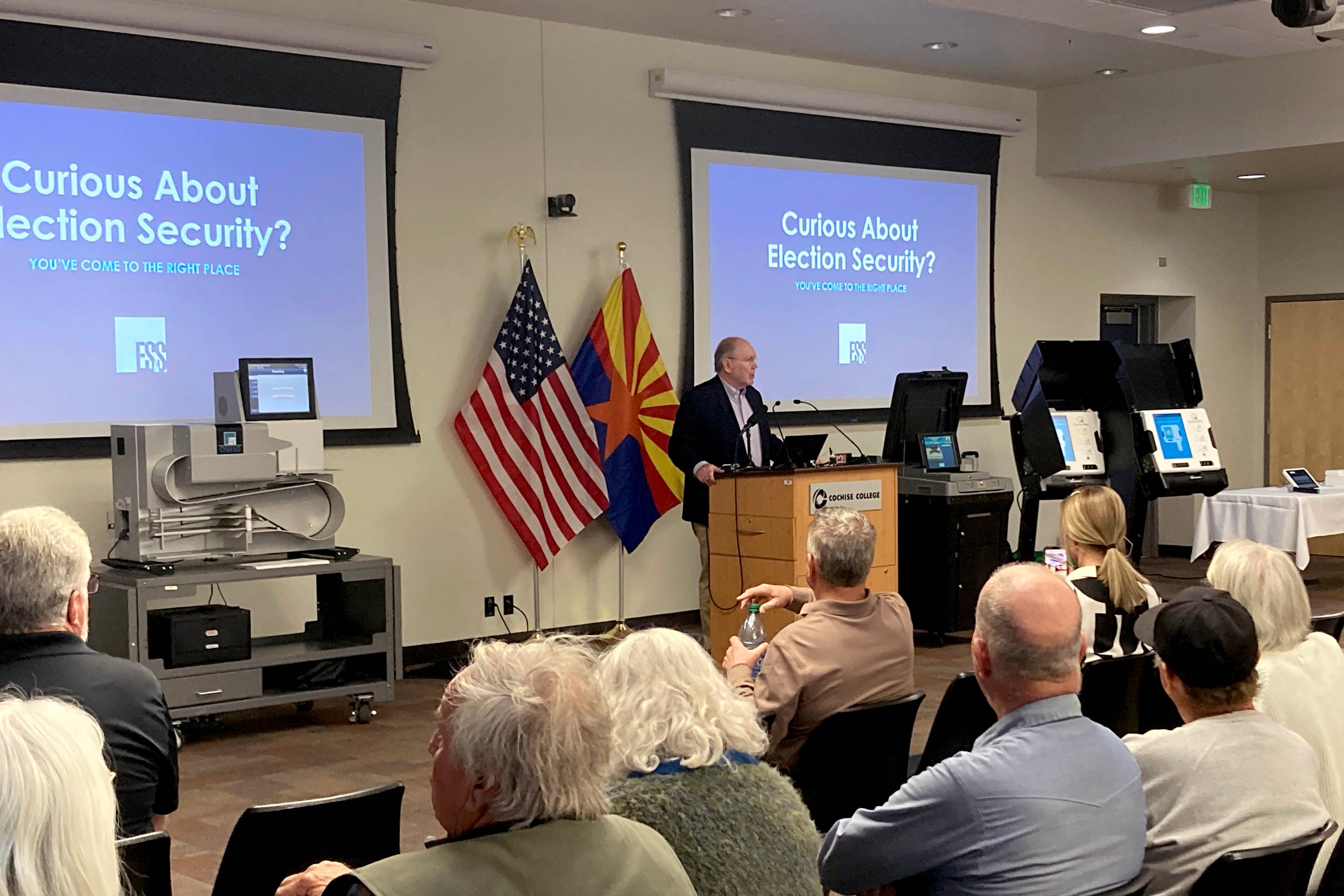Votebeat is a nonprofit news organization reporting on voting access and election administration across the U.S. Sign up for our free newsletters here.
Sierra Vista — At the base of the Huachuca Mountains near the Mexican border, in a city built next to an Army base, crowds gathered to look at the machines that some of them believe have been stealing their votes.
Chris Wlaschin, the security lead for the machine manufacturer Election Systems & Software, brought the equipment to this city to try and convince them otherwise. Attempting to connect with the veteran-heavy audience, he told them he, too, was a veteran, and described himself as a patriot.
“I have too much to risk,” Wlaschin told them, “by coming up here and not telling you the truth.”
But the rumblings in the room suggested not everyone believed him.
As he laid out how his company tries to ensure accurate and secure voting, some attendees were shaking their heads or whispering to neighbors. “We have to be able to trust that our votes are being counted,” said one attendee, Danny Bergene, who wore a black shirt reading “HELL NO, JOE” with a rifle pictured on it. “And,” he continued, “no one trusts the machines.”
More than a year after the midterm election and a commotion that drew national attention, distrust continues unabated in conservative Cochise County. It was here that GOP claims of a stolen gubernatorial election prompted Republican supervisors Tom Crosby and Peggy Judd to try to hand-count all ballots and block the certification of the county’s votes. Now, Crosby and Judd face pending felony charges after a state grand jury found they conspired and interfered with an election.
County officials are trying to educate the public on how elections are run, hoping to rebuild trust. The Democratic Party is running candidates for all three supervisor spots in what they say is an effort to regain “responsible county government.” And Judd said in an interview she’s changed her mind about how much influence she, as a supervisor, can have on election matters.
“It’s a state matter,” she said. “I’ve settled on that.”
Bringing about change is difficult in a county so influenced by outside voices. Many seem to have made up their mind about the fairness of elections, or are more worried about other problems: Their roads need work. Their water resources are diminishing. And border crossings by undocumented immigrants are more than double this year than last, overwhelming local resources in the communities nearest the border.
Theresa Walsh, a Democrat challenging Crosby in the upcoming election, said these are the issues people want to talk about when she’s campaigning.
“I was going around and talking to people, and they were like, Who is Tom Crosby?’” Walsh said. “What is a supervisor?”
How election misinformation came to Cochise
Cochise County, in the southeast corner of Arizona hours away from Phoenix, is larger in square miles than the state of Connecticut but has just 125,000 residents. More than half live away from the population center of Sierra Vista, in small cities and towns that pepper the rugged desert and mountainous landscape. Getting to those towns means heading off the main highway, sometimes for an hour or more.
Long before Wlaschin came to town, Cochise County residents began listening to other sources who were telling them elections were rigged, and it was the voting machines that made that possible.
At first, it was former President Donald Trump and his unproven claims of vote switching in the 2020 election. Then came gubernatorial candidate Kari Lake, whose unproven claims of fraud and wrongdoing in Maricopa County’s midterm election resonated with many voters here, where contempt for the state’s most populous county can run high.
“All the sudden, there was this vroom,” said Sierra Vista resident Bob Karp, gesturing with his hands to suggest an explosion.
Crowds showed up to county supervisors meetings in 2022 and pressured them not to certify the election. After two delays, a court forced supervisors to vote yes.
Longtime elections director Lisa Marra, well respected by her peers across the state, soon left, citing pressure and harassment after supervisors attempted to force her to illegally hand-count all ballots during the post-election audit. The county gave election duties to County Recorder David Stevens, a Republican who has expressed doubts about election security and was entangled in the hand-count push. Stevens then hired a new elections director who had spread unfounded claims of election fraud in 2020, but he resigned months later after facing intense criticism.
The county manager then called on Tim Mattix, the city clerk who had recently retired, to come back and take the job. He did, though he’s since laid low.
At the meetings last week, he stayed in the back. These voting machine demonstrations were partly his idea, but he didn’t speak at them. When it was time to introduce notable people in the room, the county manager introduced Stevens and others, but not Mattix.
After a demonstration of the machines, attendees asked several questions about how people vote in-person in the county. While the vast majority of Arizona counties use hand-marked paper ballots at polling places, in Cochise County, voters make their choices on a touch-screen machine. Those machines print out a ballot so the voter can review their selections before casting the ballot into a separate machine.

Attendees were suspicious of the barcodes on those ballots, which are encoded with the voter selections for the tabulation machines to read. They also asked several questions about why the voter check-in system has a secure wi-fi connection, and about how data is encrypted. Throughout the discussion, Wlaschin seemed keen on convincing the crowd that he, himself, could be trusted.
“If I thought for a minute that ES&S was doing something wrong in terms of security, I would call the attorney general myself,” he said at one point.Tricia Gerrodette of Sierra Vista said it was nice to hear about the security features on the machines. She likes that voters can review a printed ballot that shows their selections.
County spokesperson Jane Montgomery said the county received positive feedback from people who said they hadn’t fully understood the layers of security the systems include. But she also said county officials recognize “there continue to be differing opinions” about the use of machines to count votes.
Election issues amid other local concerns, politics
Part of the problem is reaching voters at all.
The next day, in Tombstone, a tourist town about a 30-minute drive from Sierra Vista down a two-lane highway, Robert Scott, manager of the Trump Store, said he hadn’t heard about the meetings in the first place. Even if he had, he may not have gone. He’s busy working two jobs — running the store and as a janitor elsewhere.
He is convinced that Trump’s claims of vote switching are true and that Democratic Gov. Katie Hobbs fixed the 2020 and 2022 elections in Arizona, he said, despite the court challenges presenting these claims being dismissed.
He lives in Tombstone, he said, but he doesn’t pay much attention to local politics and didn’t know Crosby and Judd had been indicted.
“That seems ridiculous,” he said.
But his main local concern, he said, is “that road between St. David and Benson.”
“This bridge out there is down to one lane,” he said. “It’s been that way for over a year. They haven’t done any work on it for months.”

When Walsh talks to voters, she said, they bring up water conservation, border security, and taxes. If they do mention elections, they ask how much the lawsuits related to the midterm election are costing county taxpayers. Judges ordered the county to pay $89,000 in attorney fees and legal costs to the parties that filed the lawsuit to stop the full hand-count, for example, and $36,000 for the case regarding the supervisors’ refusal to certify the election.
The Democratic Party — which only makes up about 24% of the voting population here — is supporting candidates for all three county supervisor positions for the first time in more than a decade. They are hoping Walsh, a retired Army colonel, can oust Crosby in a district with 19% registered Democrats, and that they can hold onto the seat currently held by Democrat Ann English, who is not running for re-election in her district, which is about 34% Democratic. Judd is also not running again. They are also hopeful about the Democratic candidate challenging Stevens in the recorder race, Anne Carl.
Karp, who is managing Walsh’s campaign, said that if Walsh and Carl won, it would do a lot to bring the community back together.
“It would stop this distrust, chaos, and lack of respect for people with a different viewpoint,” he said.
Judd stepped down from serving as the supervisors’ chairman this week, citing family health issues, and sided with English, the Democrat, to replace her. She said she doesn’t trust Crosby to run the meetings because he goes on “rants” and has been disrespectful to county attorneys he disagreed with, such as on potential open meeting law violations.
“We need to make sure we move the county forward,” she said. “Our poor attorney doesn’t deserve to be publicly chastised just because she was doing her job.”
Crosby didn’t return requests for comment. His and Judd’s trial is set for May, two months before ballots go out for the state’s Aug. 6 primary election.
Meanwhile, Walsh isn’t the only one who wants Crosby’s spot. Clint Briseno, a Republican, is challenging him in the primary. Briseno said he had planned to run for supervisor even before the election issues began. But seeing everything unfold — especially the way Marra was treated — convinced him that the county “can do better.”
As far as the voting machines, he said the technology is a blessing for the county. Hand-counting isn’t accurate, he said.
Even if Cochise can convince residents to keep the machines, though, that’s just the start
As one of the meetings wrapped up, a woman wearing a mint-colored suit began to yell from the back of the room. The real problem with the elections, she said, was the noncitizens on the voter rolls, and coming across the border, appearing to be alluding to Trump’s latest claim that Democrats are allowing immigrants to cross the border so they can vote. That’s where the fraud is at, she said.
“Arizona alone will bring them all down.”
Jen Fifield is a reporter for Votebeat based in Arizona. Contact Jen at jfifield@votebeat.org.





